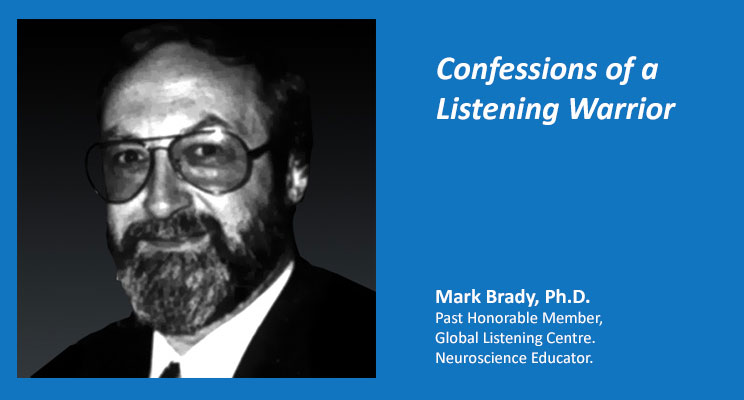
Confessions of a Listening Warrior
Mark Brady, Ph.D.
Past Honorable Member,
Global Listening Centre.
Neuroscience Educator.
Over many decades I’ve personally explored or at least inquired into a wide variety of spiritual traditions on Planet Earth. I’ve looked at their philosophies, their traditions, their specific practices.
I’ve shaken with the few remaining American Shakers, whirled with American dervishes, davened with reform and conservative Jews and sung Jesus praises with American Evangelicals. I wrote my Ph.D. dissertation on applying spiritual principles to the contemporary workplace. Out of all that exploration, contrary to the Buddhist directive to “take the one seat,” I’ve managed to amalgamate a single, personally relevant spiritual practice. Ironically, it’s one that doesn’t really work so easily for me – thus requiring me to keep at it: Listening Practice.
There are many reasons Listening Practice is so challenging. One is: if you listen to other people long enough and deeply enough – meaning, with emotional resonance – sooner or later they will say something that will hijack your limbic system, setting your hippocampus, amygdala, pituitary and adrenals ablaze. The neurotransmitters and neuromodulators these brain and body parts activate appear to put a blockade on the brain’s ability to transmit signals between important neural structures. Particularly affected is the bridge between my cortical or Executive Function real estate and my brain’s emotional strongholds. Departed mystical science writer Joseph Chilton Pearce, author of The Magical Child (and many other books) said it succinctly: “Anxiety is the enemy of intelligence.” That seems repeatedly apparent in my experience. What makes it particularly insidious though, is that anxiety is also the enemy of awareness: we act unskillfully and fail to realize it while we’re doing so. I hate it when I’m being a plank and don’t have a clue. Which, thanks to our left brain bully Dominator, happens a lot more often than many of us ever suspect.
Any action I can take to reduce stress then, generally works as an antidote: it enhances my brain’s ability to make critical connections, especially along the Rich Neural Superhighway. Ever notice how stressful life events frequently look and feel differently after a good night’s sleep? Listening Practice then, turns out to be the perfect action I can take without needing a nap. Interestingly, I’ve actually been doing Listening Practice without realizing it. The first time was when I used my skin and bones and began responding to my mother’s voice a few weeks into the egg in utero. Like we all did.
The Stress of the Void
I sometimes have the mind-numbing experience of staring at a blank piece of paper, unable to write a single word. That blank piece of paper generates stress-induced “writer’s block” – brain neurons simply refusing to make connections. But then I write the first sentence. That first sentence then triggers another, followed by another and another. To facilitate that writing process, Zen writing teacher Natalie Goldberg advises, “Just keep the pen moving across the paper” (which is essentially how this column came into being).
Deep Listening is the interpersonal, heuristic (experimental, trial-and-error aid to learning) equivalent of just keeping the pen moving across the paper. It allows us room to draw random connections from all corners of the thought stream which our brains are very good at haphazardly activating. The more skillfully we can listen to what other people (or we ourselves) have to say without judgment (positive or negative), blame or criticism, the greater the capacity for being able to relax. Out of that ease, brain neurons begin to joyfully connect and energy and information can flow. Thoughts arise. Meanings get made. Resolutions emerge. Healing often happens (depending upon a multitude of variables, the opposite also appears to be true according to this article by Jonah Lehrer).
The Generosity of Reciprocal Listening
Many years ago Harville Hendrix and his wife, Helen Hunt, introduced something they called Imago Relationship Work. One central feature of their work was Deep Listening. They advocated using the prefrontal cortex – excellent for planning and carrying out the plans we make – for designing structured time for deep listening exchanges. A half hour each, two or three times a week of soft, intimate, tender truth-telling. Of course, since the compulsion to heal the trauma is often buried amidst a dung heap of traumatic memories, when given the chance, such memories will almost invariably surface – often showing up as displaced attacks and disappointments in you, the listener! And this is when Listening Practice gets real. Real and hard.
Thomas Lewis and his colleagues, writing in A General Theory of Love, had this to say about hard loving: In a relationship, one mind revises the other; one heart changes its partner. This astounding legacy of our combined status as mammals and neural beings is limbic revision: the power to remodel the emotional parts of the people we love, as our Attractors (coteries of ingrained information patterns) activate certain limbic pathways, and the brain’s in exorable memory mechanism reinforces them. Who we are and who we become de pends, in part, on whom we love.
And whom we love depends in significant measure, on whom we mindfully listen to, especially when thrashing about in the depths of the hard stuff. When emotionally tough stuff surfaces in listening sessions and threatens guarantees to capture your mindfulness flag, I have two pieces of advice: 1. Shut up. Whatever urge you might have to say something in response, I can almost guarantee will NOT be helpful; nor will it be well-received. People in the midst of emotional reactivity can rarely make good sense of words. Their brains are working a very different neural dynamic. Their listening circuitry is temporarily short-circuited. So, if you must offer advice, wait until later when the limbic circuits have cooled.
The second piece of advice is admittedly more difficult: don’t take it personally. Emotional upsets are rarely about anything real happening in the moment, and they’re even more rarely truly about you. They just look and feel that way. Which makes it challenging, of course, not to take things personally. In case you haven’t noticed, the work of learning to change that look and feel is really hard, thus it’s one major reason I constantly remind myself to call it Listening … Practice.
Dr. Mark Brady is an internationally-known neuroscience educator. Dr. Brady was a long-time member of the graduate research faculty at Sofia University. Mark also spent 10 years at The Center for Advanced Study in the Behavioral Sciences at Stanford, one of the nation’s premier think tanks (as an undercover cultural anthropologist disguised as the facilities manager). He is also the prize-winning author of a number of books, magazine articles and academic papers. Some of his books on listening are: Noble Listening, A Manager’s Book of Listening, A Father’s Book of Listening, The Wisdom of Listening, and Fierce Listening. In 2016 Mark will publish the third book in his listening trilogy: Sacred Listening. He also researches and writes a weekly column on social neuroscience, The Flowering Brain. An elite academic scholar, intellectual, outstanding listener and remarkable human being, his support of Sardool Singh, Secretary, GLC, was greatly appreciated and foundational to the development of the Global Listening Centre.

